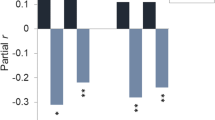Abstract
In two large samples we show a dissociation between trait-level tendencies to mind-wander spontaneously (unintentionally) and deliberately (intentionally). Participants completed online versions of the Mind Wandering Spontaneous (MW-S) and the Mind Wandering Deliberate (MW-D) self-report scales and the Five Facet Mindfulness Questionnaire (FFMQ). The results revealed that deliberate and spontaneous mind wandering were uniquely associated with some factors of the FFMQ. Notably, while the MW-D and the MW-S were positively associated with each other, the MW-D was uniquely positively associated with the ‘Non-Reactivity to Inner Experience’ factor of the FFMQ, whereas the MW-S was uniquely negatively associated with this factor. We also showed that conflating deliberate and spontaneous mind wandering can result in a misunderstanding of how mind wandering is related to other traits. We recommend that studies assessing individual differences in mind wandering should distinguish between deliberate and spontaneous subtypes of mind wandering to avoid possibly erroneous conclusions.
Similar content being viewed by others
References
Baer, R. A., Smith, G. T., Hopkins, J., Krietemeyer, J., & Toney, L. (2006). Using self-report assessment methods to explore facets of mindfulness. Assessment, 13, 27–45.
Baird, B., Smallwood, J., Mrazek, M. D., Kam, J. W., Franklin, M. S., & Schooler, J. W. (2012). Inspired by distraction mind wandering facilitates creative incubation. Psychological Science, 23, 1117–1122.
Baird, B., Smallwood, J., & Schooler, J. W. (2011). Back to the future: autobiographical planning and the functionality of mind-wandering. Consciousness and Cognition, 20, 1604–1611.
Bernhardt, B. C., Smallwood, J., Tusche, A., Ruby, F. J., Engen, H. G., Steinbeis, N., Singer, T. (2014). Medial prefrontal and anterior cingulate cortical thickness predicts shared individual differences in self-generated thought and temporal discounting. NeuroImage, 90, 290–297.
Brown, K. W., & Ryan, R. M. (2003). The benefits of being present: mindfulness and its role in psychological well-being. Journal of Personality and Social Psychology, 84, 822–848.
Carriere, J. S. A., Seli, P., & Smilek, D. (2013). Wandering in both mind and body: individual differences in self-reported mind wandering and inattention predict fidgeting. Canadian Journal of Experimental Psychology, 67, 19–31.
Giambra, L. M. (1995). A laboratory method for investigating influences on switching attention to task-unrelated imagery and thought. Consciousness and Cognition, 4, 1–21.
Kane, M. J., Brown, L. H., McVay, J. C., Silvia, P. J., Myin-Germeys, I., & Kwapil, T. R. (2007). For whom the mind wanders, and when an experience-sampling study of working memory and executive control in daily life. Psychological Science, 18, 614–621.
Killingsworth, M. A., & Gilbert, D. T. (2010). A wandering mind is an unhappy mind. Science, 330, 932.
Levinson, D. B., Smallwood, J., & Davidson, R. J. (2012). The persistence of thought evidence for a role of working memory in the maintenance of task-unrelated thinking. Psychological Science, 23, 375–380.
McVay, J. C., & Kane, M. J. (2009). Conducting the train of thought: working memory capacity, goal neglect, and mind wandering in an executive-control task. Journal of Experimental Psychology. Learning, Memory, and Cognition, 35, 196.
McVay, J. C., & Kane, M. J. (2010). Does mind wandering reflect executive function or executive failure? Comment on Smallwood and Schooler (2006) and Watkins (2008). Psychological Bulletin, 136, 188–197.
Mrazek, M. D., Phillips, D. T., Franklin, M. S., Broadway, J. M., & Schooler, J. W. (2013). Young and restless: validation of the Mind-Wandering Questionnaire (MWQ) reveals disruptive impact of mind-wandering for youth. Frontiers in Psychology,. doi:10.3389/fpsyg.2013.00560.
Mrazek, M. D., Smallwood, J., & Schooler, J. W. (2012). Mindfulness and mind-wandering: finding convergence through opposing constructs. Emotion, 12, 442.
Ottaviani, C., & Couyoumdjian, A. (2013). Pros and cons of a wandering mind: a prospective study. Frontiers in Psychology,. doi:10.3389/fpsyg.2013.00524.
Schneider, R. J., Hough, L. M., & Dunnette, M. D. (1996). Broadsided by broad traits: how to sink science in five dimensions or less. Journal of Organizational Behavior, 17, 639–655.
Seli, P., Carriere, J. S., Levene, M., & Smilek, D (2013). How few and far between? Examining the effects of probe rate on self-reported mind wandering. Frontiers in Psychology. doi: 10.3389/fpsyg.2013.00430
Seli, P., Carriere, J. S. A., Thomson, D. R., Cheyne, J. A., Ehgoetz Martens., K. A., & Smilek, D. (2014). Restless mind, restless body. Journal of Experimental Psychology: Learning, Memory, and Cognition. doi:10.1037/a0035260
Seli, P., Cheyne, J. A., & Smilek, D. (2013b). Wandering minds and wavering rhythms: linking mind wandering and behavioral variability. Journal of Experimental Psychology: Human Perception and Performance, 1, 1–5.
Shaw, G. A., & Giambra, L. (1993). Task-unrelated thoughts of college students diagnosed as hyperactive in childhood. Developmental Neuropsychology, 9, 17–30.
Smallwood, J. (2013). Distinguishing how from why the mind wanders: a process—occurrence framework for self-generated mental activity. Psychological Bulletin, 139, 519–535.
Smallwood, J., & Andrews-Hanna, J. (2013). Not all minds that wander are lost: the importance of a balanced perspective on the mind-wandering state. Frontiers in Psychology,. doi:10.3389/fpsyg.2013.00441.
Smallwood, J., Baracaia, S. F., Lowe, M., & Obonsawin, M. C. (2003). Task-unrelated-thought whilst encoding information. Consciousness and Cognition, 12, 452–484.
Smallwood, J., Ruby, F. J., & Singer, T. (2013). Letting go of the present: mind-wandering is associated with reduced delay discounting. Consciousness and Cognition, 22, 1–7.
Smallwood, J., & Schooler, J. W. (2006). The restless mind. Psychological Bulletin, 132, 946.
Smith, G. T., Fischer, S., & Fister, S. M. (2003). Incremental validity principles in test construction. Psychological Assessment, 4, 467–477.
Thomson, D. R., Besner, D., & Smilek, D. (2013). In pursuit of off-task thought: mind wandering-performance trade-offs while reading aloud and color naming. Frontiers in Psychology,. doi:10.3389/fpsyg.2013.00360.
Acknowledgments
This research was supported by a Natural Sciences and Engineering Research Council of Canada (NSERC) discovery grant to Daniel Smilek and an NSERC Vanier Canada Graduate Scholarship to Paul Seli.
Author information
Authors and Affiliations
Corresponding author
Rights and permissions
About this article
Cite this article
Seli, P., Carriere, J.S.A. & Smilek, D. Not all mind wandering is created equal: dissociating deliberate from spontaneous mind wandering. Psychological Research 79, 750–758 (2015). https://doi.org/10.1007/s00426-014-0617-x
Received:
Accepted:
Published:
Issue Date:
DOI: https://doi.org/10.1007/s00426-014-0617-x




